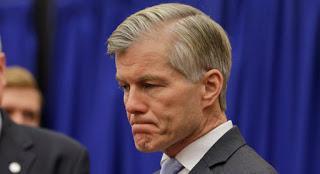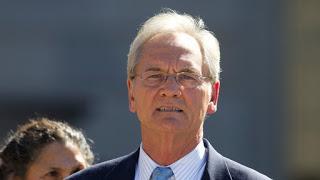
Robert McDonnell
The bigger issue, however, is this: Why did the nation's highest court agree to hear the McDonnell case when it has repeatedly refused to hear appeals from former Alabama Governor Don Siegelman. After all, the two cases present almost identical legal questions.
Tom Jackman, of The Washington Post, reports that the effect of Scalia's death on the McDonnell case might not be as cut and dried as many observers think. Here is how Jackman summarized the issues:
For some Supreme Court watchers, the death of Justice Antonin Scalia equated to bad news for the future of former Virginia governor Robert F. McDonnell, whose final appeal now rests with the high court. With only eight justices on the court, the thinking went, a conservative-liberal bloc deadlock of 4 to 4 would affirm McDonnell’s 2014 conviction and send him to prison while leaving the definition of “public corruption” fairly broad.
But that’s far from the only possibility, a number of court experts said this week. Most of the other options mean either a delay or even vindication for McDonnell (R), who has always argued that his actions after accepting loans, vacations and gifts from a Richmond businessman did not constitute “official acts” subject to criminal prosecution.
As you can see, it's undisputed that McDonnell benefited personally from favors heaped upon him by Virginia businessman Jonny Williams--and there was no such evidence in the Siegelman case. That makes convictions in the Siegelman case much more shaky legally than those in the McDonnell case. On top of that, McDonnell was sentenced to two years in federal prison after his conviction on public-corruption charges, while Siegelman continues to serve a much longer sentence--part of which was based on charges for which he was acquitted. So why is SCOTUS prepared to hear one case while consistently rejecting the other?
At least one commentator, David Swanson, has asked if the decision to hear McDonnell means the Supreme Court is set to virtually make bribery legal. Swanson uses the McDonnell and Siegelman comparison to make his point. The headline on Swanson's piece: "How the Supreme Court Could Legalize Direct Bribery: An Innocent Man Behind Bars, A Guilty Man Free":
Two U.S. state governors have recently been convicted of taking bribes: Alabama’s Don Siegelman and Virginia’s Bob McDonnell. Siegelman has been in prison for over four years though he was targeted by politically motivated prosecutors and was never accused of any personal gain. McDonnell was bribed with a Rolex watch, plane tickets, dinners, trips, loans, catering, golf bags, and i-phones, and, according to his successful prosecutors took official actions in his capacity as governor to benefit the person bribing him within minutes of receiving various loot. The U.S. Supreme Court has kept McDonnell and his wife (also convicted) out of prison as it considers his case. A bipartisan collection of 113 current and former state Attorneys General urged the Supreme Court to correct the injustice to Siegelman, and it declined to consider it.
The U.S. Supreme Court was uninterested in a bribery case like Siegelman’s that involved no bribery. What’s frightening is its interest in a case like McDonnell’s. His lawyers will argue that while he and his wife clearly benefited, he didn’t know everything his wife had promised in return for the bribes, nor did he agree to it, nor did he deliver on it. There is clearly the potential that the new standard in U.S. politics going forward will be that you can give luxury toys and personal bribes directly to an office holder, as long as he or she fails to deliver the public policy you asked for, or as long as he or she doesn’t try very hard to deliver it.
Such a standard would open the door to direct bribery of politicians in a new way not achieved by Citizens United and related rulings that facilitate bribery through campaigns and PACs and foundations. As long as the two parties are discreet, who will be able to prove that the favor your politician did your corporation was actually in response to the Mercedes you gave him?
SCOTUS' decision to hear McDonnell v. United States, raises questions about blatant inconsistency in our federal appellate courts. It also raises this question: Why does the nation's highest court steer clear of Siegelman like it was radioactive waste, while gladly hearing other cases that raise the same issues--first, in a case from Florida, and now, in one from Virginia.
Is Siegelman left to rot in a Louisiana federal prison because he's a Democrat, while McDonnell remains free--and receives an audience before SCOTUS--because he's a Republican? Does the high court avoid Siegelman because the prosecutorial, judicial, and political corruption that led to his conviction is so deep-seated and disturbing that the justices feel compelled to make sure it remains under wraps?
Those questions might seem "out there," but under the circumstances, perhaps they are not so far-fetched. Here is how the Supreme Court docket describes the issues raised in McDonnell:
Issue: Whether “official action” under the controlling fraud statutes is limited to exercising actual governmental power, threatening to exercise such power, or pressuring others to exercise such power, and whether the jury must be so instructed; or, if not so limited, whether the Hobbs Act and honest-services fraud statute are unconstitutional.
Every one of those issues was present in the Siegelman case and could have been addressed back in 2010, maybe even earlier. Here is how Adam Liptak, of The New York Times, describes issues in McDonnell:
Mr. McDonnell, a Republican, was prosecuted on charges that he had used his office to help a businessman, Jonnie R. Williams Sr., who had showered the governor and his wife with luxury products, loans and vacations. The gifts themselves were legal, and the question in the case was whether they were part of a corrupt bargain in which Mr. McDonnell reciprocated by using the power of his office to help Mr. Williams.
Mr. McDonnell arranged meetings for and attended events with his benefactor. But Mr. Williams, whose company made a diet supplement, met with no real success in obtaining support for his product from the state. A jury found that Mr. McDonnell’s actions amounted to corruption, and a federal appeals court upheld the conviction. . . .
In urging the Supreme Court to hear his appeal, Mr. McDonnell’s lawyers said he had done no more than extend “routine political courtesies” to Mr. Williams. “This is the first time in our history that a public official has been convicted of corruption despite never agreeing to put a thumb on the scales of any government decision,” the brief said.
McDonnell's lawyers are wrong about that. The same thing happened in Siegelman--and powerful evidence suggests that prosecutors had to coach and threaten chief witness Nick Bailey to get him to concoct a story about Siegelman and codefendant Richard Scrushy reaching an agreement.

Don Siegelman
If you imagine the Supreme Court's interest is in correcting injustice, as opposed to expanding the legalization of bribery, have another look at the Don Siegelman case. Siegelman was by far the most successful Democratic politician in an overwhelmingly Republican government in Alabama. When he won reelection as governor in 2002, the election result was reversed after Republican officials in a single county waited until the Democratic officials had gone home, then recounted the votes and determined that there had been an error. Despite Democrats' objections of impropriety and pointing out that the voters whose votes were switched away from Siegelman didn't -- as one would have expected -- have their votes similarly "corrected" in other races, the Republican Attorney General of Alabama upheld the result and forbid any manual recount to verify it.Republican lawyer Jill Simpson describes "a five-year secret campaign to ruin the governor," during which Karl Rove, President George W. Bush's senior political advisor, asked her to "try to catch Siegelman cheating on his wife." Rove associate Bill Canary, she says, told her that his wife Leura and friend Alice Martin, both federal prosecutors, would "take care of" Siegelman. When Siegelman began running to win his office back two years after losing it, the U.S. Justice Department took him to trial alleging a Medicaid scam, but the judge listened to the opening argument and then threw out the case as worthless.
The "Justice" Department kept trying, and finally got Siegelman on bribery. His offense? He was not alleged to have pocketed a dime or to have received any support through any foundation or committee. Rather, he re-appointed a man [Richard Scrushy] to a board who had been appointed to the same position by the previous three governors, a man who made contributions to a state lottery to pay for college scholarships for poor kids. Yes, Siegelman's idea to help poor people with a lottery seems to have missed the fact that lotteries are taxes on poor people. But does that make him guilty of bribery or justify prosecutors targeting him?
Swanson's piece includes thoughts from Joseph Siegelman, the former governor's lawyer son who has filed a lawsuit against the U.S. Department of Justice, seeking documents about the case:
A U.S. House Committee investigated the Siegelman case and asked Karl Rove to testify. He declined. And the committee declined to hold him in contempt or to use inherent contempt. He was simply allowed to refuse. Now Siegelman's son, attorney Joseph Siegelman, has filed suit seeking documents from the U.S. government. I asked him what he hopes to find.
"Every stone that gets overturned ends up showing something negative," he said. As an example he pointed to the Justice Department's description of an email from a prosecutor of Siegelman to the campaign manager [Rob Riley] of his main Republican opponent, a description of an email that didn't become public until years after Siegelman's trial. "We don't know what else they have to hide," said Joseph Siegelman.I asked Joseph Siegelman about the Supreme Court's decision to hear McDonnell's case and not his father's, and he exclaimed, "How can our system of justice be so skewed?"
